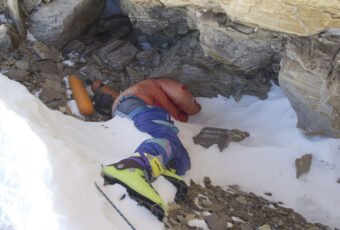In the seemingly peaceful streets of Charleston, West Virginia, a chilling encounter unfolded that would not only grip the nation but also shed light on the sinister underbelly of online advertisements and the grave risks faced by those in the sex work industry. Heather Saul, a sex worker, found herself fighting for her life against Neal Falls, a man who had responded to her online ad with murderous intent. What began as a routine client meeting quickly descended into a terrifying struggle for survival, forcing Heather to make a life-or-death decision that would ultimately expose the disturbing possibility that Falls was a potential serial killer, with her as his next intended victim.
The Violent Attack and Heather’s Survival
The encounter began routinely, with Falls responding to Heather’s online advertisement on Backpage.com. However, his unsettling behaviour quickly escalated into aggression when he brandished a gun and issued a chilling ultimatum: “Live or die?” Thus began a terrifying struggle for survival.

As Falls attempted to overpower her, Heather fought back fiercely. During the struggle, Falls started strangling her, but she managed to hit him in the groin, momentarily disorienting him. In the kitchen, Falls made a critical mistake: he placed the gun down within Heather’s reach. Seizing the moment, Heather grabbed the gun and fired over her shoulder, hitting Falls and ending the attack.
Heather’s quick thinking and courage likely saved her life and potentially many others. Her ability to remain calm under pressure and use available opportunities highlights the critical importance of self-defense skills in dire situations.
The Chilling Discovery: A “Kill Kit”
Initially, the scene appeared to be a straightforward case of self-defense. However, the investigation took a dark turn when police searched Falls’ car, uncovering a meticulously organized “kill kit” – a collection of weapons, tools, restraints, a bulletproof vest, and cleaning supplies, all suggesting premeditated violence involving abduction, torture, and murder.
According to Lieutenant Steve Cooper of the Charleston Police Department, the contents of Falls’ vehicle were deeply unsettling: “We found four sets of handcuffs in his pants pockets. I’ve never seen anything like that personally, and I’ve been a detective for 18 years.” The disturbing discovery led authorities to believe that Falls had sinister plans to abduct or carry away a victim from Heather’s apartment, as evidenced by the presence of a large Rubbermaid bin – one large enough to fit a human body.
This chilling revelation shifted the narrative from a straightforward case of self-defence to a potential breakthrough in multiple unsolved cases involving missing and murdered individuals, particularly those in the sex work industry. Law enforcement agencies quickly mobilized, working with federal and state agencies to trace Falls’ movements and potential connections to other disappearances and murders across several states where he had lived.
Extensive Investigations and Potential Links
As the investigation progressed, detectives noted striking similarities between the items found in Falls’ possession and evidence from certain unsolved murders and disappearances, particularly those involving sex workers. One crucial piece of evidence found in Falls’ car was a list containing the first names, phone numbers, and ages of six women – all suspected to be sex workers.
In a pivotal move, Falls’ DNA was entered into the national Combined DNA Index System (CODIS) database, with the hope of identifying any matches with evidence from unsolved crime scenes across the country. The FBI was consulted to provide a comprehensive profile on Falls and assist in identifying potential behavioural patterns that could link him to other crimes.

These extensive investigative efforts underscored the critical importance of interagency cooperation in solving complex cases involving potential serial criminals. Lieutenant Cooper emphasized the collaborative nature of the investigation, stating, “They have FBI agents in the other states and in other jurisdictions that are interested in Mr. Falls. So everybody is working together, but again we are looking for victims instead of suspects in this case, so it’s complicated.”
The ongoing nature of the investigation meant that every new piece of evidence held the potential to solve long-standing mysteries and bring closure to families who had been seeking answers for years regarding the disappearances or murders of their loved ones.
The Aftermath: Support, Scrutiny, and Heather’s Resilience
In the aftermath of the harrowing attack, Heather Saul found herself thrust into the national spotlight, attracting a whirlwind of attention from various groups and individuals – some well-intentioned, others with ulterior motives.
The community’s reaction was one of widespread support and admiration for Heather’s bravery. Local residents and people across the country praised her quick thinking and courage, portraying her as a hero who potentially stopped a serial killer from claiming more victims. News outlets across the nation featured her story, with the New York Daily News running a headline that read, “HOOKER BLOWS KILLER AWAY.”
However, the unrelenting attention also brought unwanted scrutiny and pressure, with some attempting to control the narrative and the funds raised for her support. Within days of the incident, multiple online fundraisers emerged, each claiming to have Heather’s blessing and attempting to meet with her in person.
One such fundraiser was organized by Laura Gandee, a local Charleston resident who claimed to have received a text from a friend stating that Heather was “hungry, upset, and feeling all alone in her apartment.” Gandee visited Heather, bringing her food and later posted a cheerful photo of her to social media, accompanied by a link to an online fundraiser that reportedly raised thousands of dollars.
Another individual, Nostra-Thomas Koning, became involved in handling the technical aspects of the crowdfunding efforts. However, according to Heather, Koning stated that she would not receive the funds unless she met certain conditions, suggesting a desire to control the narrative surrounding her story.
The incident resonated deeply within the sex worker community and their advocates, who expressed relief and gratitude towards Heather for bringing to light the grave dangers they face on a regular basis. Advocacy groups seized the opportunity to push for more protective measures and legal reforms aimed at ensuring the safety and rights of sex workers.
Law enforcement agencies, initially taken aback by the disturbing contents of the “kill kit,” launched a thorough investigation. They commended Heather’s actions, acknowledging that she had likely prevented further violence. The case prompted discussions on improving protocols and training for officers handling similar cases with sensitivity and effectiveness.
Heather’s Perspective and Ongoing Challenges
In the months following the traumatic attack, Heather found herself grappling with the aftermath and the unwanted attention that consumed her life. She received offers of support from various individuals and groups, some of whom attempted to assert control over her narrative and the funds raised for her well-being, despite her objections.
Heather expressed frustration with those who claimed to be helping her but instead made decisions on her behalf or imposed conditions on the assistance they offered. She recounted how individuals like Gandee and Koning pressured her to comply with their demands, with Koning suggesting that she would not receive the fundraised money unless she proved herself worthy, hinting at potential substance abuse issues.
“He wasn’t going to be the reason why I overdosed and died,” Heather recalled Koning saying, though he later denied making such a statement.
Heather felt overwhelmed by the constant knocks on her door, the incessant media requests, and the pressure to seize the fleeting attention surrounding her harrowing story. Even law enforcement officials, including Lieutenant Cooper, acknowledged the intense scrutiny Heather faced, with Cooper admitting to using the threat of a search warrant as a “tactic” to get Heather to open her door to concerned individuals.
Additionally, Heather struggled with ongoing challenges, such as obtaining proper identification, finding stable housing, and dealing with the trauma of the attack and a subsequent break-in at her apartment. The relentless scrutiny surrounding her life choices and the pressure to capitalize on the media attention only exacerbated her difficulties.
Throughout this ordeal, Heather remained steadfast in her desire for autonomy and the chance to heal on her own terms. She expressed a deep mistrust of those who sought to exploit her story or impose their own agendas upon her, longing for the opportunity to make her own decisions and move forward at her own pace, free from external pressures or exploitation.
“Tell anyone. No one is making decisions for me,” Heather asserted, emphasizing her determination to maintain control over her own life and narrative.
As society grapples with these complex issues, it is essential to prioritize the safety, autonomy, and well-being of those engaged in sex work, while also addressing the underlying systemic factors that contribute to their marginalization and vulnerability. This may involve exploring decriminalization or legalization models, implementing harm reduction strategies, and fostering greater collaboration between law enforcement, advocacy groups, and the sex worker community itself.
Ultimately, Heather’s story serves as a powerful reminder that every human life is valuable, and that our collective efforts should be focused on creating a society where no one is forced to risk their safety or dignity in pursuit of survival. By embracing empathy, understanding, and a commitment to protecting the most vulnerable among us, we can work towards a future where incidents like the one Heather endured are a relic of the past.
Read more from the website:










